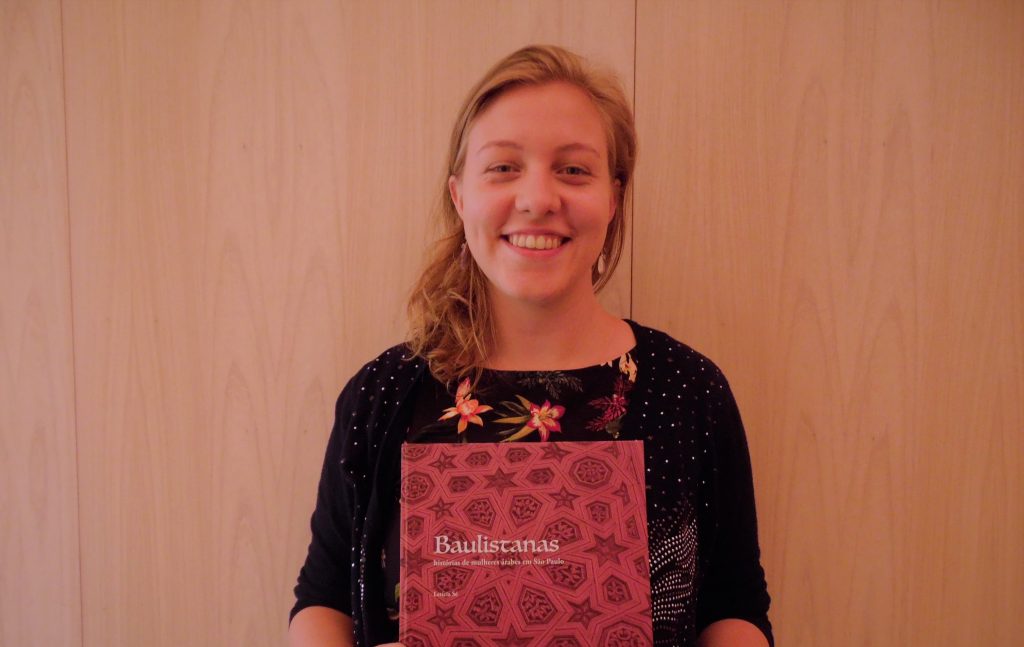São Paulo – Letícia Sé first heard about the Middle East issue during high school. After a class about the history of the Arab countries and Palestine, Sé started studying the theme on her own from several perspectives. “I feel like the Arab issue is barely discussed. I intend to help people to have a more delicate view, specially about Palestine. It is addressed only as a religious problem, about religious extremists, and that is not good. I hope to contribute for a less crystallized view on this theme and these people,” concluded Letícia Sé.
The recently graduated journalist contributes by giving a space for other women to talk. Over one year, in 2018, she produced the book ‘Baulistanas: Histórias de mulheres árabes em São Paulo’ [Baulistanas: Histories of Arab women in São Paulo]. The title is a wordplay with the interviewees accent, since in Arabic there is no ‘p’ as Brazilians know it. The most similar sound in the Arabic alphabet is ‘ba.’
The text was written last year in as an end-of-course paper the journalism school in Faculdade Casper Líbero in São Paulo. Now the content has been edited and became a book she self-published in order to distribute a few copies. The author is looking for a publishing house to make a large-scale publication. In 2015, when she moved to São Paulo, the student started covering events and demonstrations with Middle Eastern themes. “Because my mother family has a history of migration, I feel close to this, even if it is about the Arab people. I get the question of identity, of not being in a place where you came from. There’s this empathy, but our situations are very different,” reveals the Portuguese-descendant journalist.
Her passion for the Arab history led the journalist to teach Portuguese to refugees. And learn Arabic from them. In this process, Sé became increasingly interested in the language and its dialects. Traveling with her college to Morocco during the 2016 Conference of Parties/United Nations Climate Change Conference (COP22), held in Marrakesh, she was in contact the Moroccan Arabic.
After that, the journalist studied this dialect with the Moroccan Arabic teacher Felipe Benjamin from USP, and is now learning the so-called modern standard Arabic. “This experience gave me an idea of the differences inside the Arab world. Learning dialects opened my mind to understand the specific contexts of each migration before simply categorizing them under one umbrella. The very idea to call someone ‘Turkish’ has a political bias behind it,” she told.
Those experiences made her want to produce the book. The introduction gives an overview about the Arab immigration to Brazil and who these people were before becoming merchants in São Paulo downtown. “So, starting from the interviews, I started to see the different in the Arab communities. The Palestinian community, for example, wanted to preserve their identity as a matter of activism, resistance,” she exemplified.
Baulistanas, Arab women
Sé explained she chose to interview women because her intention was to give Arab women a voice to tell their own stories. “I wanted that because I’m tired of seeing stories where the man, the head of the family, speaks and then the woman just nods. They are not protagonists. And I think this is reinforced in the case of refugees. The clichés the media puts forth. So, I thought, why not talk about the gender issue? The whole world is talking about it, awakening to this point. What is our role in this society where everyone is sexist?,” she questioned.
As a reporter, the author also sees her work as an opportunity. “The easiest source isusually the man. But as a female journalist, this is a little different. For me, it is easier to interview a woman. I feel like the media wants to be more male-centered, so it is easier for them to interview a man. I tried using this gender tool as a point of discussion,” she explained.
After a pause, the journalist continues. “I was nervous at the beginning. Would they feel comfortable to talk about her problems and feelings? Because I don’t want to expose this person. I wanted to do something very humane, showing people are just people in every place and situation. They are just women. They have their gender struggles in their own contexts. They have their Arab habits and love their culture. I wanted to show both sides,” said Sé.
Out of the three profiles composing the book, two are of women born in Arab countries and one interviewee is a second-generation immigrant in Brazil. “I’d already met these women because I go to events, cover demonstrations. And they accepted telling their stories.” The book focus on the Levant region, formed by Syria, Lebanon and Palestine. The only limitation the author imposed herself was the search for characters from these three countries. “Each person has their unique way and that shows. It was very rich to see how each of them had her own tone. The young artist has one, the female activist has another, and the teacher has yet another one,” she remembered.
Contact:
Letícia Sé
Email: [email protected]
Translated by Guilherme Miranda




